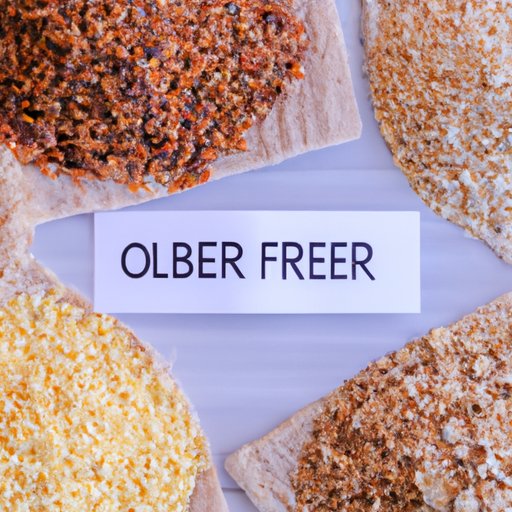
Introduction
While fiber is an important part of a healthy diet, is it possible to have too much of a good thing? Yes, consuming too much fiber can be detrimental to digestive health, causing a range of unpleasant side effects. This article aims to explore the negative effects of overeating fiber and offers practical tips for mindful eating to help maintain digestive health. This article is intended for anyone who is interested in learning more about how fiber affects their body and how to consume it in moderation.
The Importance of Fiber in a Balanced Diet
Fiber is a type of carbohydrate that is not digested by the body. Unlike other carbohydrates, fiber passes through the digestive system intact and helps regulate bowel movements. Some types of fiber, such as soluble fiber found in oats and beans, can also help lower cholesterol and stabilize blood sugar levels. The recommended intake of fiber varies by age and gender, but on average, adults should aim for 25-30 grams per day.
The positive effects of fiber on the body are numerous. In addition to promoting regular bowel movements, fiber can help reduce the risk of heart disease and type 2 diabetes. A high-fiber diet can also help with weight loss, as fiber-rich foods tend to be more filling and keep you feeling full for longer periods. Overall, fiber is an essential part of a healthy, balanced diet.
From Bloating to Diarrhea: Common Side Effects of Overeating Fiber-Rich Foods
While fiber is necessary for digestive health, consuming too much fiber can cause unpleasant side effects. Some people are more susceptible to fiber-induced digestive problems than others, particularly those with digestive disorders such as IBS or Crohn’s disease. Common side effects of overeating fiber-rich foods include:
- Bloating and gas: Excessive fiber intake can lead to increased gas production, causing bloating and discomfort.
- Constipation: Ironically, consuming too much insoluble fiber can actually lead to constipation, as the fiber can bulk up stools and make them harder to pass.
- Diarrhea: On the opposite end of the spectrum, consuming too much soluble fiber can lead to diarrhea, as the fiber absorbs water in the digestive system and softens stools.
Mindful Eating: Tips to Avoid Consuming Too Much Fiber and Its Potential Effects
Controlling fiber intake is important for avoiding its negative side effects. Here are some tips for mindful eating to help regulate fiber intake:
- Start slow: If you are not used to eating a lot of fiber, start by incorporating fiber-rich foods gradually into your diet.
- Monitor fiber intake: Keep track of your daily fiber intake and adjust as necessary.
- Listen to your body: Pay attention to how do you feel after eating fiber, and adjust your diet accordingly.
- Balance fiber intake: Pair high-fiber meals with other food groups such as protein and healthy fats to help regulate digestion and prevent negative side effects.
Challenging the Fiber Myth: Debunking the Belief That More Fiber Is Always Better
Some people believe that consuming as much fiber as possible is beneficial for overall health, but this is not necessarily true. While fiber is essential to our bodily functions, too much of it can lead to negative side effects. Instead of focusing on consuming as much fiber as possible, it’s essential to consume a moderate amount of fiber as part of a balanced diet.
According to a study published in the World Journal of Gastroenterology, excessive fiber intake can lead to several digestive problems, including diarrhea, abdominal pain, and flatulence. Therefore, it’s vital to consume fiber in moderation to prevent gastrointestinal problems.
High Fiber Foods That Can Limit Daily Intake: Navigating a Plant-Based Diet with Moderation in Mind
For people following a plant-based diet, fiber is a vital staple. However, the key is to consume fiber mindfully, avoiding excessive intake. Some high fiber foods that should be consumed in moderation include:
- Whole grains: While whole grains are a good source of fiber, they should be consumed in moderation as they contain a higher amount of insoluble fiber, which can lead to constipation.
- Legumes: Beans, lentils and chickpeas however a good source of protein and fiber. However, it’s important to introduce them slowly into your diet, as a sudden increase in fiber intake can causes unpleasant digestive symptoms.
Some alternative plant-based foods that can help maintain a balanced diet while still limiting fiber intake include sweet potatoes, quinoa, and tofu.
When to Seek Medical Attention: Understanding Severe Fiber-Related Conditions and Their Signs
For most people, moderate fiber consumption is safe and healthy. However, excessive fiber intake over a prolonged period can lead to more severe digestive conditions such as diverticulitis. Diverticulitis is a condition where small pouches form in the lining of the intestine, causing inflammation and infection. If you experience any of the following signs of diverticulitis, it’s important to seek medical attention immediately:
- Severe abdominal pain
- Fever
- Bloody stool
- Vomiting
Conclusion
In conclusion, consuming too much fiber can be detrimental to digestive health, causing bloating, gas, constipation, and diarrhea. However, with mindful eating and moderation, fiber intake can be regulated to prevent these negative side effects while still enjoying the benefits of this vital nutrient. It is important to monitor fiber intake and pair high-fiber meals with other food groups to maintain good digestive health. Eating a balanced diet is key to maintaining overall good health.





